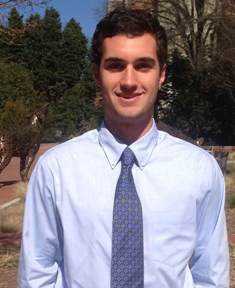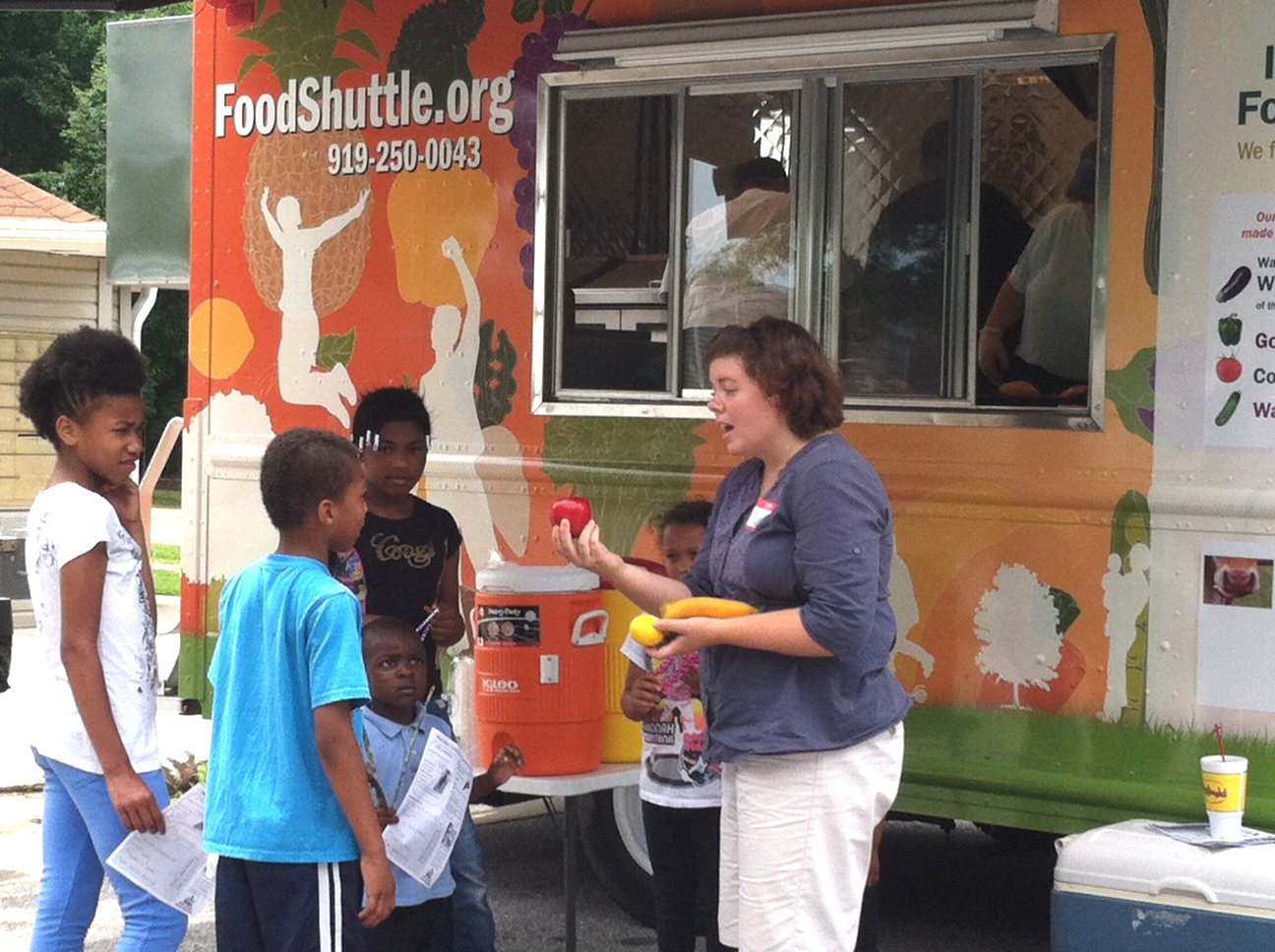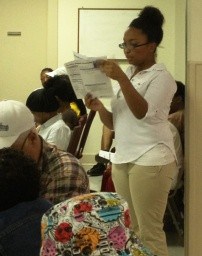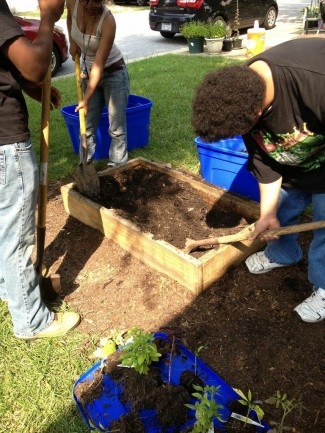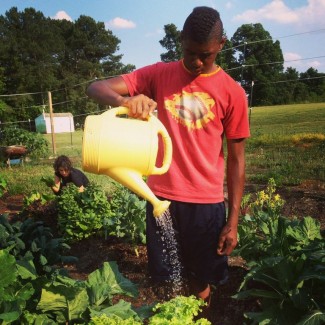Reflections from a summer spent gleaning, from our pun-loving Field Gleaning Intern Michelle Madeley This summer, I interned with the Field Gleaning Program at the Inter-Faith Food Shuttle. I helped out as a field supervisor once a week and spent additional time developing training materials. As a graduate student interested in access to healthy foods, working with the Inter-Faith Food Shuttle was an incredible experience in learning about non-profit solutions to systemic societal issues like hunger in the U.S.
Gleaning addresses the twin problems of food insecurity and food waste by working with local farmers who have additional crops (due to extra planting, experimentation, crops being ready too early, or crops not looking "market-ready" but still being nutritious and delicious). IFFS brings crews of volunteers out to the fields that farmers donate and we harvest various crops, always working to fill the truck to the brim!
In one instance, the farmer even drove up on a tractor, disc attached, just as we were wrapping up. He asked if we got all that we needed, and I told him that we were indeed done and thankful for all that he contributed! He said, "Great. I'm going to disc up that field now." By the time we were all packed up, he was already getting started tilling in the onion field from which we had just harvested hundreds of pounds of quality onions. So, it was quite a literal example of gleaning healthy, viable food, that would have otherwise gone to waste (or into the soil) if we had not been there!
Beyond the sheer volume of fresh, healthy food we helped redistribute, I was most excited about the community I felt a part of. The people I met and worked with made the experience of interning with the Food Shuttle so rewarding. I will definitely take these memories and lessons with me, and come back to volunteer with the Food Shuttle as often as possible.
Some of the highlights:
Befriending volunteers.It was especially cool to get to know new people from all age groups. I got to work with groups of middle school volunteers from mission groups, families with kids of all ages, retirees, as well as peers. I feel lucky to have met so many great people!
The big laughs and friendly conversations. I'm way into laughing, and every Tuesday that I was out in the field, there were a lot of serious and silly conversations that generated belly laughs resonating across the rows of collard greens or squash plants.
The team spirit. Every Tuesday, I helped facilitate a gleaning in a new field, with a different crop, and a totally new group of people. We always had the same set of tools, but with the different variables, we approached the fields differently each week. Sometimes, people would pair up and discover more efficient harvesting and loading techniques. Sometimes, people would volunteer to rotate loading and harvesting. People helped remind each other about which row they had been harvesting corn from, or offered to carry heavy buckets. There was always a real sense of teamwork and with that comes new and creative problem-solving.
And even the inevitable challenges. I found myself saying, "Every week there is an adventure" because it was true! We got stuck in the mud! We couldn't figure out how to fill the truck with diesel! We couldn't find the field! We didn't bring the right equipment! We found ourselves in fields that had been flooded and found every step we would sink into mud! As I think about these obstacles, I consider them all reminders about flexibility and adaptability. In the end, none of these challenges stopped us or even really slowed us down. We asked for help or we made do with what we had. It's a great testament to the spirit of volunteers and a can-do attitude. Thanks for everything Michelle! We’re excited to see where your journey will take you next. Come back any time!






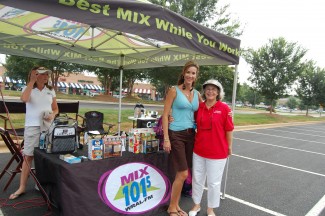

 In addition to Bibb lettuce, LL Urban Farms also grows grafted heirloom tomatoes, peppers, and eggplants through an outdoor hydroponic system, and sells locally grown vegetables (both organic and conventional), fruits, cheese, seafood, and other farmers market staples at their farm stand on Holly Springs Road. LL Urban Farms grows their produce without any pesticides or herbicides. Oh, and they expect the farm could profit $100,000 off of an acre a year, combining retail and wholesale profits!
In addition to Bibb lettuce, LL Urban Farms also grows grafted heirloom tomatoes, peppers, and eggplants through an outdoor hydroponic system, and sells locally grown vegetables (both organic and conventional), fruits, cheese, seafood, and other farmers market staples at their farm stand on Holly Springs Road. LL Urban Farms grows their produce without any pesticides or herbicides. Oh, and they expect the farm could profit $100,000 off of an acre a year, combining retail and wholesale profits! Hydroponics is a technique of growing plants without soil, using a liquid nutrient solution that reaches the plant roots generally by either flowing through an inert substrate in which the plant is placed (often some sort of sand or gravel mix) or by being pumped through tubes that hold plant roots. LL Urban Farms starts the seedlings in a system of pipes that circulate water, with a rock wool cube immersed in the water.
LL Urban Farms grows tomatoes, eggplants, and peppers outdoors in “bato buckets” (which have a special notch at the bottom to fit over a drain pipe), filled with a mixture of perlite, vermiculite, and gravel, designed to hook up to a pipe that cycles the water from the pump and then back to the well – a 300 a gallon tank at LL Urban Farms.
Hydroponics is a technique of growing plants without soil, using a liquid nutrient solution that reaches the plant roots generally by either flowing through an inert substrate in which the plant is placed (often some sort of sand or gravel mix) or by being pumped through tubes that hold plant roots. LL Urban Farms starts the seedlings in a system of pipes that circulate water, with a rock wool cube immersed in the water.
LL Urban Farms grows tomatoes, eggplants, and peppers outdoors in “bato buckets” (which have a special notch at the bottom to fit over a drain pipe), filled with a mixture of perlite, vermiculite, and gravel, designed to hook up to a pipe that cycles the water from the pump and then back to the well – a 300 a gallon tank at LL Urban Farms.
 This past weekend large numbers of caterpillars were discovered devouring our parsley transplants in the greenhouse. Their distinctive coloring and lack of horns tipped us off that they were not the usual tomato hornworm larvae that we often see in the field. Our resident butterfly expert and incubator farmer Elizabeth Mann was called in. Elizabeth identified the culprits as Swallowtail butterfly larvae who – yes, have a predilection for parsley. Hand-picking the offending future butterflies from our transplants, Elizabeth requisitioned several parsley plants to keep them well fed in rearing boxes until they enter chrysalis in about two weeks.
This past weekend large numbers of caterpillars were discovered devouring our parsley transplants in the greenhouse. Their distinctive coloring and lack of horns tipped us off that they were not the usual tomato hornworm larvae that we often see in the field. Our resident butterfly expert and incubator farmer Elizabeth Mann was called in. Elizabeth identified the culprits as Swallowtail butterfly larvae who – yes, have a predilection for parsley. Hand-picking the offending future butterflies from our transplants, Elizabeth requisitioned several parsley plants to keep them well fed in rearing boxes until they enter chrysalis in about two weeks. Food Shuttle incubator farmer Mike Carpenter has been spreading delight and pain around the farm lately as he pursues test subjects with plates of peppers cut into tiny slivers urging them “Here! Try this one!.” Some of Mike’s fermented pepper sauces are surprisingly smooth and mild and good sources of lacto-bacillus pro-biotics. Others are being studied as candidates for materials to initiate fusion energy.
Food Shuttle incubator farmer Mike Carpenter has been spreading delight and pain around the farm lately as he pursues test subjects with plates of peppers cut into tiny slivers urging them “Here! Try this one!.” Some of Mike’s fermented pepper sauces are surprisingly smooth and mild and good sources of lacto-bacillus pro-biotics. Others are being studied as candidates for materials to initiate fusion energy.




